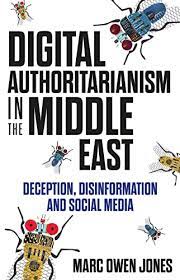Reseña de Marc OWEN JONES (2022): Digital Authoritarianism in the Middle East. Deception, Disinformation and Social Media, Hurst publishers, London.

Palavras-chave:
Autoritarismo digital, Emiratos Árabes Unidos, Arabia Saudí, Golfo, Oriente Medio y Norte de ÁfricaCopyright (c) 2022 Álvaro de Argüelles Lugo

Este trabalho está licenciado sob uma licença Creative Commons Attribution-NonCommercial 4.0 International License.
Resumo
A pesar de que las Primaveras Árabes generaron la ilusión de que las redes sociales servirían para lograr la expansión de la democracia por el mundo árabe, la práctica ha demostrado que la tecnología digital se ha convertido en una de las muchas herramientas al servicio de regímenes autoritarios para controlar a su población. En Oriente Próximo, el debate en el mundo virtual está hoy dominado por la censura, la propaganda, la desinformación y el engaño, una realidad que no es exclusiva de la región pero que se agrava especialmente en ésta porque no existe un sector periodístico independiente que pueda contrarrestar el avance de la llamada “era de la posverdad”.
Digital Authoritarianism in the Middle East es el primer intento sistemático de comprender cómo plataformas como Twitter pueden ser empleadas para controlar y manipular a la ciudadanía. El libro pone el foco en el Golfo Árabe, en particular, en Arabia Saudí y en Emiratos Árabes Unidos, y en aquellas prácticas que implican la difusión deliberada de contenido falso a través de cuentas con identidades ficticias, troles y bots.
